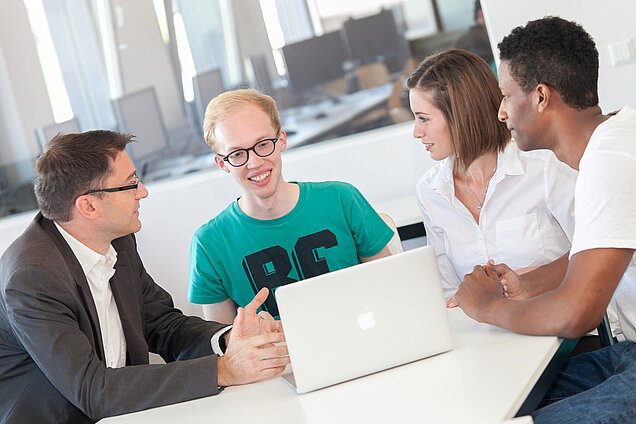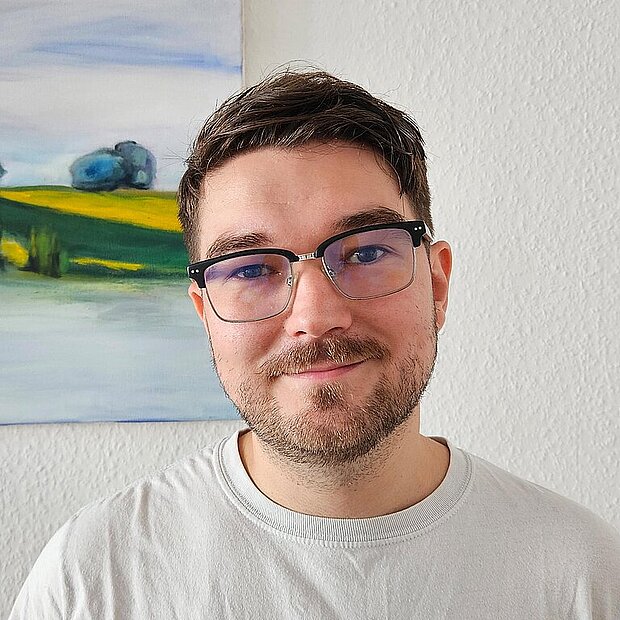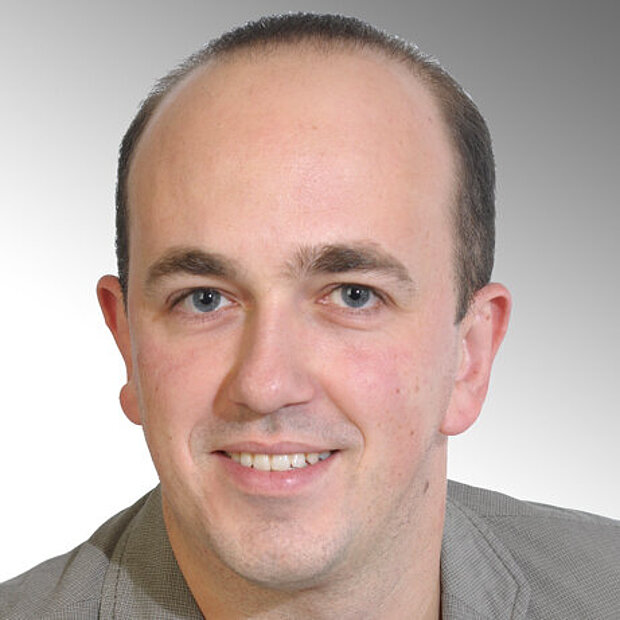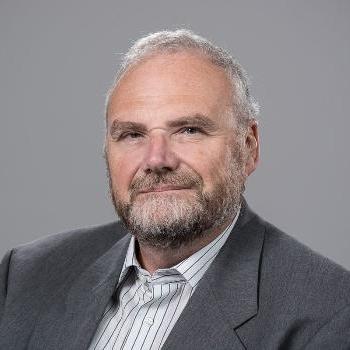

The master class in computer science!
Master of Computer Science
Bringing the Flexibility of Computer Science to Application
Have you successfully completed a Bachelor's degree program in computer science? Do you want to delve deeper, expand your knowledge, and push the boundaries of the science of computer science? Let us be your companion on your journey towards earning a Master of Science degree!
Profile line
Do you want to focus on a specific area of expertise and explore and advance the state-of-the-art in computer science? We offer two profile lines where you can work with us on current issues in computer science:
- Software Development
- Human-Technology Interaction
Degree
Master of Science
Study Type
Graduate Studies, Präsenzstudium
Study Model
Full time studies
Campus
Zweibrücken
Faculty
Computer Sciences and Microsystems Technology
Normal period
3 Semester
Requirements
Bachelor degree in a cs-related program.
Pre Placement
No
Start Informations
Summer and Winter Term Program can be started in winter and in summer term!
Teaching Language
Accreditation
Internal accreditation
Why study computer science at Kaiserslautern University of Applied Sciences:
The application areas of computer science are diverse, and the career prospects are very good. With specialization offerings and project work, you can focus on an application area that deepens your existing knowledge or complements it with additional competencies. The specialization subjects serve a dual role: they provide a solid foundation in important and economically relevant topics while also serving as an application domain for acquiring methodological skills.
Profile Line: Software Development
How do we develop complex software systems? How do we address the human factor in an IT project? We enable you to employ, implement, and adapt best practices to specific constraints in all phases of a software project, from requirements analysis through software architecture to testing and continuous deployment.
Profile Line: Human-Technology Interaction
How will we interact with applications in the near future? Why are smartphone apps often unusable? What possibilities for interaction between humans and technology will there be in the future? We empower you to design, implement, and evaluate interfaces between humans and technology based on the theoretical foundations of interaction design, ensuring their practical usability. Mobile applications, desktop applications, mixed reality, tactile interfaces – we impose no limits on your curiosity and creativity!

"At Kaiserslautern University of Applied Sciences, students learn through numerous practical projects, collaborating on solutions together. Due to the comparatively small size of lectures, students are not just a number to professors, and seminars address many individual questions." (Foto: Privat)
Graduate, Fabian Kalweit
General Information
During the first two semesters, demanding courses deepen and broaden your fundamental knowledge in the field. In addition to the mandatory subjects and the profile subjects of your chosen focus area, you will take elective subjects. These elective subjects include those specific to your focus area as well as modules that delve into current topics in computer science. An important module is the scientific project: we collaborate with you on a current topic in computer science. You will work on a major open-source project and further develop complex software. Alternatively, you may tackle a scientific issue from your profile line and contribute to pushing the boundaries of computer science forward. You can plan this project very flexibly; you can also earn these ECTS points during the semester break. This allows you to tailor the course of study to your personal situation.
We want you to look beyond the scope of your profile line. You will choose from a variety of cross-profile modules - from databases, data security, big data, methods of artificial intelligence to the implementation of mobile applications or mixed-reality applications - with (almost) no limits to your curiosity! The program culminates in the Master's thesis in the final semester. You can start your studies in either the summer or winter semester. The modules are designed to accommodate this very well.
Here's an example of what your studies could look like if you start in the summer or winter semester:
Starting in the summer semester: You will take elective subjects totaling 24 ECTS credits and the course "Scientific Communication," which accounts for 3 ECTS credits as part of the "Project Work" module. Towards the end of your first semester, you determine when to start your project work. This can be done at any time starting from August. You decide when the project work is due after the 16 weeks specified in the examination regulations. In the winter semester, you will take the four mandatory subjects, depending on the profile line you have chosen. This sets the stage for starting the Master's thesis in the following summer semester.
Starting in the winter semester: You will take the four mandatory subjects, depending on the profile line you have chosen. Towards the end of your first semester, you determine when to start your project work. This can be done at any time starting from February. You decide when the project work is due after the 16 weeks specified in the examination regulations. In the summer semester, you will take elective subjects totaling 24 ECTS credits and the course "Scientific Communication," which accounts for 3 ECTS credits as part of the "Project Work" module. This sets the stage for starting the Master's thesis in the following winter semester.
For admission to the Master's program, candidates must hold a first professional qualification with a good final grade in a computer science program. Further details are specified in the subject examination regulations.
If you completed your Bachelor's degree in 6 semesters, thus starting with 180 ECTS credits, you will need to earn an additional 30 ECTS credits through a selection of cross-profile elective subjects in the Master's program - resulting in a 4-semester study duration. If your Bachelor's degree comprises 210 ECTS credits, then your standard study period is 3 semesters, as outlined in the study progression plan.
Complex software projects pose a challenge. Technical aspects push us to our limits. No project is without the human factor - customers and users are paramount.
In the Software Development profile line, alongside foundational courses in Automata, Computability and Complexity, and Computer-Oriented Mathematics, you will enroll in the following courses:
- Software Engineering
- Social Skills
In the Software Development project, you will collaborate within a team to tackle a complex topic in software engineering. Complementing your profile, you will select at least one of the following profile elective courses:
- IT Management
- International Project Management
- Programming Techniques for Embedded Systems
- Secure Software Engineering
- Software Quality Management
- Distributed Systems
How will we interact with technology in the future? Will we control the technology, or will the technology control us? We must be able to specify and implement excellent interfaces.
In the Human-Technology Interaction profile line, alongside foundational courses in Automata, Computability and Complexity, and Computer-Oriented Mathematics, you will enroll in the following courses:
- Framework-Based UI Development
- Interaction Design
In the Human-Technology Interaction project, you will collaborate within a team to address a complex topic related to interfaces.
Complementing your profile, you will select at least one of the following profile elective courses:
- Advanced Interactive Systems
- Augmented and Virtual Reality
- Automotive User Interfaces
- Market and Advertising Psychology
- Methodology of Empirical Research
We want you to think outside the box! Interested in exploring a neighboring profile line? No problem, the profile subjects there can be chosen by you as elective courses. We offer you a wide range of elective courses, from which you can select starting from the first semester:
- Business Information Systems
- Compiler Construction and Programming Languages
- Data and Text Mining
- Databases and Data Analysis
- Deep Learning
- Advanced Database Systems
- Advanced Topics in Computer Graphics
- Methods of Artificial Intelligence
- Mobile Applications with Android
- Mobile Applications in Medical Technology
- Mobile Communication
- Quantum Computing and Quantum Information
Computer science is international! You can replace your cross-profile elective courses with a mobility module and study at a foreign university. To do this, you will create a learning agreement with us, study abroad, and afterward, we will recognize the academic credits you have earned there.
You have gained professional experience after completing your bachelor's degree? Or you want to deepen the skills you acquired with us in professional practice! We think that's excellent. You can bring these skills into the module "Mentor-guided practical activity" and thereby replace the cross-profile elective courses!

"The Master's program in computer science offered me the opportunity to tailor my continuing education according to my interests, thanks to its numerous elective courses. In my future work as a software engineer, I was able to apply much of what I learned to solve the challenges presented to me." (Foto: Privat)
Graduate, Mathias Fedder


